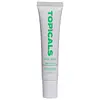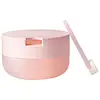What's inside
What's inside
 Key Ingredients
Key Ingredients

 Benefits
Benefits

 Concerns
Concerns

 Ingredients Side-by-side
Ingredients Side-by-side

Hydrogenated Polyisobutene
EmollientEthylene/Propylene/Styrene Copolymer
Butylene/Ethylene/Styrene Copolymer
Oryza Sativa Bran Wax
Skin ConditioningCeramide NP
Skin ConditioningCeramide AP
Skin ConditioningCeramide EOP
Skin ConditioningPalmitoyl Tripeptide-38
Skin ConditioningSodium Hyaluronate
HumectantHydrolyzed Sodium Hyaluronate
Skin ConditioningTocopheryl Acetate
AntioxidantErgothioneine
AntioxidantGlycerin
HumectantPhytosphingosine
Skin ConditioningCholesterol
EmollientPortulaca Pilosa Extract
Skin ConditioningSucrose Cocoate
EmulsifyingPanthenol
Skin ConditioningSodium Lauroyl Lactylate
EmulsifyingCarbomer
Emulsion StabilisingXanthan Gum
EmulsifyingCetearyl Ethylhexanoate
EmollientSorbitan Isostearate
EmulsifyingMentha Arvensis Leaf Oil
MaskingMentha Piperita Flower/Leaf/Stem Oil
Skin ConditioningWater
Skin ConditioningHydrogenated Polyisobutene, Ethylene/Propylene/Styrene Copolymer, Butylene/Ethylene/Styrene Copolymer, Oryza Sativa Bran Wax, Ceramide NP, Ceramide AP, Ceramide EOP, Palmitoyl Tripeptide-38, Sodium Hyaluronate, Hydrolyzed Sodium Hyaluronate, Tocopheryl Acetate, Ergothioneine, Glycerin, Phytosphingosine, Cholesterol, Portulaca Pilosa Extract, Sucrose Cocoate, Panthenol, Sodium Lauroyl Lactylate, Carbomer, Xanthan Gum, Cetearyl Ethylhexanoate, Sorbitan Isostearate, Mentha Arvensis Leaf Oil, Mentha Piperita Flower/Leaf/Stem Oil, Water
Hydrogenated Poly(C6-14 Olefin)
EmollientHydrogenated Polyisobutene
EmollientEthylene/Propylene/Styrene Copolymer
Caprylic/Capric Triglyceride
MaskingTocopheryl Acetate
AntioxidantSqualane
EmollientWater
Skin ConditioningStearyl Alcohol
EmollientLithospermum Erythrorhizon Root Extract
Skin ConditioningCetyl Alcohol
EmollientParfum
MaskingButylene/Ethylene/Styrene Copolymer
Myristyl Alcohol
EmollientHydrogenated Olive Oil Cetyl Esters
Emulsion StabilisingOryza Sativa Bran Wax
Skin ConditioningHydrogenated Lecithin
EmulsifyingButylene Glycol
HumectantCitronellol
PerfumingPentaerythrityl Tetra-Di-T-Butyl Hydroxyhydrocinnamate
AntioxidantMenthoxypropanediol
MaskingLinalool
PerfumingCeramide AP
Skin Conditioning1,2-Hexanediol
Skin ConditioningGeraniol
PerfumingLimonene
PerfumingCholesterol
EmollientCI 77492
Cosmetic ColorantHexyl Cinnamal
PerfumingCeramide NP
Skin ConditioningPropanediol
SolventPalmitic Acid
EmollientStearic Acid
CleansingGlycine Max Polypeptide
Skin ConditioningSodium Hyaluronate
HumectantEthylhexylglycerin
Skin ConditioningDisodium EDTA
Hydrolyzed Collagen
EmollientHydrolyzed Hyaluronic Acid
HumectantSodium Hyaluronate Crosspolymer
HumectantHyaluronic Acid
HumectantPaeonia Albiflora Root Extract
Skin ConditioningSodium Acetylated Hyaluronate
HumectantPaeonia Albiflora Flower Extract
TonicHydrogenated Poly(C6-14 Olefin), Hydrogenated Polyisobutene, Ethylene/Propylene/Styrene Copolymer, Caprylic/Capric Triglyceride, Tocopheryl Acetate, Squalane, Water, Stearyl Alcohol, Lithospermum Erythrorhizon Root Extract, Cetyl Alcohol, Parfum, Butylene/Ethylene/Styrene Copolymer, Myristyl Alcohol, Hydrogenated Olive Oil Cetyl Esters, Oryza Sativa Bran Wax, Hydrogenated Lecithin, Butylene Glycol, Citronellol, Pentaerythrityl Tetra-Di-T-Butyl Hydroxyhydrocinnamate, Menthoxypropanediol, Linalool, Ceramide AP, 1,2-Hexanediol, Geraniol, Limonene, Cholesterol, CI 77492, Hexyl Cinnamal, Ceramide NP, Propanediol, Palmitic Acid, Stearic Acid, Glycine Max Polypeptide, Sodium Hyaluronate, Ethylhexylglycerin, Disodium EDTA, Hydrolyzed Collagen, Hydrolyzed Hyaluronic Acid, Sodium Hyaluronate Crosspolymer, Hyaluronic Acid, Paeonia Albiflora Root Extract, Sodium Acetylated Hyaluronate, Paeonia Albiflora Flower Extract
 Reviews
Reviews

Ingredients Explained
These ingredients are found in both products.
Ingredients higher up in an ingredient list are typically present in a larger amount.
We don't have a description for Butylene/Ethylene/Styrene Copolymer yet.
Ceramide AP is a type of Ceramide.
Ceramides are intercellular lipids naturally found in our skin that bonds dead skin cells together to create a barrier. Having a strong skin barrier leads to more firm and hydrated skin.
They are known for their ability to hold water and thus are a great ingredient for dry skin. By bolstering the skin ceramides act as a barrier against irritating ingredients. This can help with inflammation as well.
If you would like to eat ceramides, sweet potatoes contain a small amount.
Read more about other common types of ceramides here:
Ceramide NP
Ceramide EOP
Ceramide NP is a type of ceramide.
Ceramides are intercellular lipids naturally found in our skin that bonds dead skin cells together to create a barrier. They are known for their ability to hold water and thus are a great ingredient for dry skin.
Ceramides are an important building block for our skin barrier. A stronger barrier helps the skin look more firm and hydrated. By bolstering the skin ceramides act as a barrier against irritating ingredients. This can help with inflammation as well.
If you would like to eat ceramides, sweet potatoes contain a small amount.
Read more about other common types of ceramides here:
Ceramide AP
Ceramide EOP
Cholesterol is a class of organic molecules called lipids. It helps hydrate your skin and is essential to having a healthy skin barrier.
Our skin naturally contains cholesterol in the outermost layer. Besides cholesterol, it also contains ceramides and fatty acids. Cholesterol makes up about 1/4 of your skin's outer layer and barrier. Your skin barrier is responsible for keeping allergens and microbes out. Having a healthy skin barrier is also responsible for keeping your skin firm and plump.
Our bodies use cholestrol to create vitamin D, steroid hormones, and more.
Learn more about CholesterolWe don't have a description for Ethylene/Propylene/Styrene Copolymer yet.
Hydrogenated Polyisobutene is a synthetic polymer. Polymers are compounds with high molecular weight. Hydrogenated Polyisobutene is an emollient and texture enhancer.
In one study, Hydrogenated Polyisobutene showed better skin hydration levels than Caprylic/Capric Triglyceride. As an emollient, it helps keep your skin soft and hydrated by trapping moisture in.
Hydrogenated Polyisobutene is often used as a mineral oil replacement.
Learn more about Hydrogenated PolyisobuteneOryza Sativa Bran Wax is wax from the outer layer of a rice kernel. It has moisturizing properties due to its polysaccharides and omega-3 fatty acids content.
This ingredient is a byproduct of milling rice, or the operation to produce a whole grain rice product.
Sodium Hyaluronate is hyaluronic acid's salt form. It is commonly derived from the sodium salt of hyaluronic acid.
Like hyaluronic acid, it is great at holding water and acts as a humectant. This makes it a great skin hydrating ingredient.
Sodium Hyaluronate is naturally occurring in our bodies and is mostly found in eye fluid and joints.
These are some other common types of Hyaluronic Acid:
Learn more about Sodium HyaluronateTocopheryl Acetate is AKA Vitamin E. It is an antioxidant and protects your skin from free radicals. Free radicals damage the skin by breaking down collagen.
One study found using Tocopheryl Acetate with Vitamin C decreased the number of sunburned cells.
Tocopheryl Acetate is commonly found in both skincare and dietary supplements.
Learn more about Tocopheryl AcetateWater. It's the most common cosmetic ingredient of all. You'll usually see it at the top of ingredient lists, meaning that it makes up the largest part of the product.
So why is it so popular? Water most often acts as a solvent - this means that it helps dissolve other ingredients into the formulation.
You'll also recognize water as that liquid we all need to stay alive. If you see this, drink a glass of water. Stay hydrated!
Learn more about Water